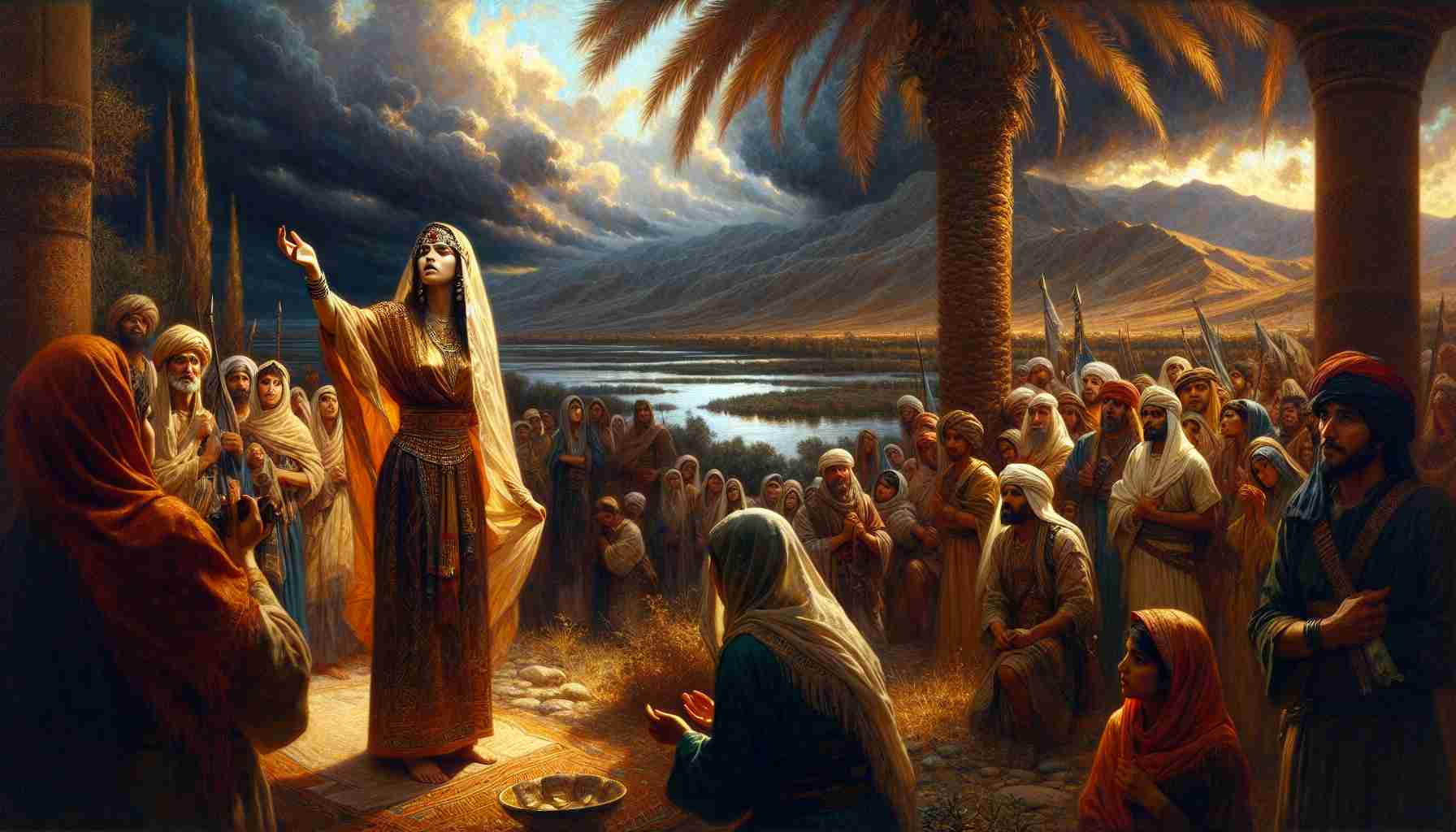

I wasn’t a prophet, just a girl from the lowlands, the kind people ignored unless they needed grain or goats. My name is Eyla, and I lived in the days when Devorah—the prophetess and judge—sat under the palm tree, between Ramah and Beit El, settling disputes and listening to Hashem—the name we use to speak of God—with a patience deeper than the well near my home.
But this is not a story about court cases or goats. It’s about the day she told me and all of Israel that we had to rise and fight.
I remember carrying jugs to the hill road when I saw her. Devorah, tall and still, with eyes like fire under her headscarf. Women stopped walking. Men parted the way. She wasn’t a warrior, not like Barak—he led our armies—but when she spoke, people trembled just the same.
That day, dark clouds gathered not just in the sky. For twenty years, we had suffered under Sisera, the cruel general who served King Yavin. He burned our crops, stole our sons, and filled our nights with fear. Some whispered that Hashem had turned away from us. But Devorah taught that it was we who had turned—from mitzvot, the sacred deeds and commandments, and from each other.
I had stopped praying. My parents were gone, my younger brother taken to build Sisera’s roads. I blamed Hashem for the silence, for not coming down to fight Himself.
But Devorah didn’t shout at heaven. She stood, calm, and sent messengers to Barak, saying, “Hashem commands you: Go, take ten thousand men, for I will deliver Sisera into your hand.”
Barak hesitated. He didn’t want to go without her. Maybe he, too, had lost trust.
“I will go with you,” she answered, “but you must know—the honor of victory will not be yours. Hashem will give Sisera into the hands of a woman.”
I felt shame then. Shame for thinking she was only words. Devorah walked beside the soldiers, not with a sword but with certainty. Her faith was her weapon.
I wasn’t a soldier. But I cooked bread for the battalion. I helped grind barley and whispered the Shema—a prayer that reminds us God is One—before we sent the food.
And when the rain fell, and the Kishon River swelled, flooding Sisera’s chariots, we knew what Devorah had known all along: Hashem had never left us. We had just stopped listening.
Sisera fled. A woman named Yael drove a tent peg through his head. And Devorah sang a victory song that even the youngest among us could remember. In it, she praised not herself, but Hashem, and every village that had dared to rise.
That song changed me. I began to pray again—not because all was easy, but because I had seen how one woman’s trust could turn fear into courage.
I am still just a girl from the lowlands. But I no longer wait for peace to find me. Like Devorah, I rise and work for it.
I wasn’t a prophet, just a girl from the lowlands, the kind people ignored unless they needed grain or goats. My name is Eyla, and I lived in the days when Devorah—the prophetess and judge—sat under the palm tree, between Ramah and Beit El, settling disputes and listening to Hashem—the name we use to speak of God—with a patience deeper than the well near my home.
But this is not a story about court cases or goats. It’s about the day she told me and all of Israel that we had to rise and fight.
I remember carrying jugs to the hill road when I saw her. Devorah, tall and still, with eyes like fire under her headscarf. Women stopped walking. Men parted the way. She wasn’t a warrior, not like Barak—he led our armies—but when she spoke, people trembled just the same.
That day, dark clouds gathered not just in the sky. For twenty years, we had suffered under Sisera, the cruel general who served King Yavin. He burned our crops, stole our sons, and filled our nights with fear. Some whispered that Hashem had turned away from us. But Devorah taught that it was we who had turned—from mitzvot, the sacred deeds and commandments, and from each other.
I had stopped praying. My parents were gone, my younger brother taken to build Sisera’s roads. I blamed Hashem for the silence, for not coming down to fight Himself.
But Devorah didn’t shout at heaven. She stood, calm, and sent messengers to Barak, saying, “Hashem commands you: Go, take ten thousand men, for I will deliver Sisera into your hand.”
Barak hesitated. He didn’t want to go without her. Maybe he, too, had lost trust.
“I will go with you,” she answered, “but you must know—the honor of victory will not be yours. Hashem will give Sisera into the hands of a woman.”
I felt shame then. Shame for thinking she was only words. Devorah walked beside the soldiers, not with a sword but with certainty. Her faith was her weapon.
I wasn’t a soldier. But I cooked bread for the battalion. I helped grind barley and whispered the Shema—a prayer that reminds us God is One—before we sent the food.
And when the rain fell, and the Kishon River swelled, flooding Sisera’s chariots, we knew what Devorah had known all along: Hashem had never left us. We had just stopped listening.
Sisera fled. A woman named Yael drove a tent peg through his head. And Devorah sang a victory song that even the youngest among us could remember. In it, she praised not herself, but Hashem, and every village that had dared to rise.
That song changed me. I began to pray again—not because all was easy, but because I had seen how one woman’s trust could turn fear into courage.
I am still just a girl from the lowlands. But I no longer wait for peace to find me. Like Devorah, I rise and work for it.